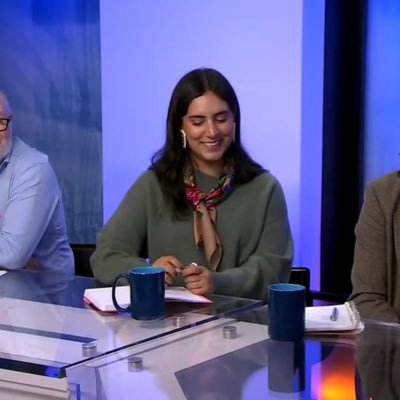
Khelsilem
@Khelsilem
Followers
18K
Following
2K
Media
788
Statuses
16K
🏠 Sḵwx̱wú7mesh-Kwakwa̱ka̱’wakw 📍Strategic Planning, Public Speaker, Policy Advisor.
Vancouver, British Columbia
Joined April 2016
If the property rights of non-Indigenous Peoples matter, do the property rights of Indigenous Peoples also matter? That's a question I'm constantly asking about how the media are covering the reactions to the Cowichan title decision.
159
47
259
A useful take on the Mamdani win in NYC and a lesson for progressives everywhere.
An important part of the story of Zohran’s successful campaign is the fact that it was originally pretty internally-controversial within DSA. There was a whole debate about whether it would be a good move to run a citywide campaign, what that would take, & who to run.
0
0
4
Premier Eby acknowledging that land in Richmond was unfairly taken from the Cowichan is an interesting admission — and one that’s sure to unsettle certain other First Nations, who’ve rejected Cowichan’s claim to that territory.
Premier Eby says he seeks to find a "balance" between protecting private property rights and correcting "injustices" of the past: "At the same time we also need to recognize that our forbearers politically displaced the Cowichan people from a plot of land unfairly and unjustly."
5
1
16
To deny that, or to insist it was “extinguished,” is to take a position that only makes sense if one assumes colonial governments had the right to erase Indigenous ownership because Indigenous peoples were “lesser.”
17
4
30
Canadian courts, international law (e.g., UNDRIP), and ethical standards all affirm that Indigenous title is a collective, inherent right — not a Crown grant.
8
3
24
Section 35 of the Constitution Act, 1982 recognizes Aboriginal rights and title as “existing.” Courts have confirmed these rights were never extinguished unless by clear, voluntary, and lawful means, which almost never occurred.
84
46
142
An argument that hasn’t worked in prior Supreme Court Cases and forces First Nations to challenge the racist assumption that Indigenous peoples were “uncivilized” and lacked systems of government, law, or property worthy of recognition.
She could have avoided this by arguing that fee simple extinguishes Aboriginal title in the Cowichan hearing. But that would've meant ignoring the April 2022 directive issued by, then Attorney General, David Eby which stopped government lawyers from using that very argument.
60
18
86
So when we say “We are on the unceded territories of the Squamish, Musqueam, and Tsleil-Waututh,” it isn’t symbolic — it’s an acknowledgment of a continuing legal reality: these Nations still have title to their lands & that Canada has never lawfully extinguished or acquired it.
74
4
66
The Crown’s title is not absolute; it is burdened by this pre-existing Indigenous ownership, which must be reconciled through negotiation, consent, or compensation.
19
1
43
In law, this means that Aboriginal title still exists — the Indigenous Nation’s right to use, manage, and benefit from the land continues to this day.
24
1
43
In Canada, this has a specific legal and constitutional meaning: “Unceded” lands are those where no treaty, sale, or agreement ever transferred ownership or jurisdiction from the Indigenous Nation to the Crown.
19
2
52
The word “unceded” means that the land was never given up or surrendered by the Indigenous people who have title to it.
742
67
374
“To be clear, the Cowichan Nation’s court case regarding their settlement lands … in Richmond has not and does not challenge the effectiveness or validity of any title held by individual private landowners. The ruling does not erase private property.” https://t.co/IOVAFqi33r
aptnnews.ca
They call the statements about the B.C. Supreme Court’s judgement on individual private property owners “deliberately inflammatory.”
9
9
18
Rather than consider that maybe we need to rethink how we approach property interests in a province which has very few areas covered by treaty, the government and citizens are clinging to the status quo.
7
2
27
First Nation files lawsuit demanding Aboriginal title over lands in western Quebec
ctvnews.ca
A First Nation has filed a title claim in Quebec Superior Court to large swaths of territory across the western part of the province.
15
20
51
It would screw over renters needing to move, young people entering the rental market, and exacerbate our already existing housing shortage by killing the potential for new housing.
Vacancy control would block predatory landlords from hiking rents and evicting renters for profit. It would restore an essential guardrail for renters — first implemented in 1974 by Barrett NDP govt, then scrapped by a conservative Social Credit govt in ‘84. #bcpoli
13
2
51
Excellent news.
5
12
61
@JoshDehaas The unceded point definitely isn't political, but rather technical. Recognizing whether or not a historic or modern treaty was signed isn't political, but is a simple statement of historical fact.
2
2
34
The Court didn’t strike down any private property. It reaffirmed that Aboriginal title is a pre-existing right — and that the Crown, not homeowners, must negotiate how to reconcile it, even where fee-simple lands were created on that title.
Dustin Rivers (a.k.a. @Khelsilem) is wrong about the legal effect of the Cowichan court ruling. The reality is the court ruled Aboriginal title trumps fee simple titles. The principle's established by the court mean that BC homeowners and business owners are now at risk of
56
30
116
I spoke on CBC's Early Edition with Stephen Quinn to shed light on what the court decision means and doesn't mean: https://t.co/GMN1d5IGbn
9
25
56












